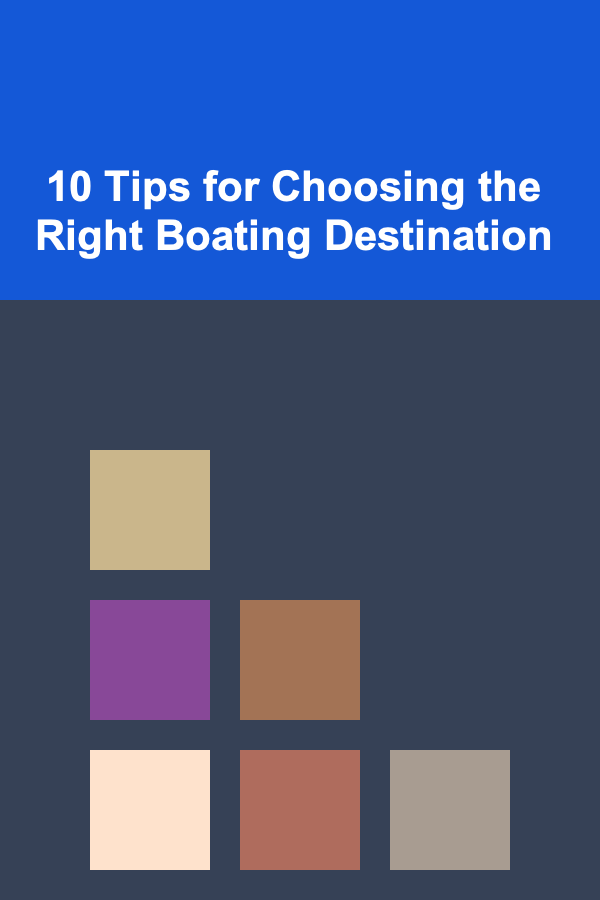
10 Tips for Choosing the Right Boating Destination
ebook include PDF & Audio bundle (Micro Guide)
$12.99$6.99
Limited Time Offer! Order within the next:

Boating is one of the most enjoyable and liberating activities available, offering an unparalleled opportunity to explore new landscapes, relax on the water, and engage in outdoor recreation. Whether you are an experienced sailor, a leisurely cruiser, or someone just starting out, choosing the right boating destination is a key factor in having a memorable and enjoyable experience. The ideal location can significantly enhance your time on the water, while the wrong one can lead to frustration, safety concerns, and missed opportunities.
Choosing the right boating destination involves more than just finding a beautiful place to visit. It requires thoughtful consideration of various factors, including the type of boat you are using, your skill level, the time of year, and your specific preferences. In this article, we will explore 10 essential tips to help you choose the perfect boating destination for your next adventure.
Determine Your Boating Style and Preferences
Before choosing a boating destination, it's crucial to evaluate your own preferences and the type of boating experience you are looking for. Boating can range from calm, relaxing day trips on a lake to challenging offshore adventures or even long-distance cruising. Identifying your desired boating style will help you narrow down potential destinations that align with your interests.
Types of Boating Experiences:
- Recreational Boating: If you are looking for a laid-back experience, choose destinations with calm waters, scenic views, and relaxed atmospheres.
- Adventure Boating: For those seeking a bit more excitement, opt for locations known for their challenging waters, such as open seas or regions with unique environmental features like rapids or strong tides.
- Fishing Boating: If fishing is a priority, consider destinations that are renowned for abundant marine life, such as coastal areas, lakes, or reservoirs.
- Cruising: If you're interested in a long-distance journey, focus on locations known for their extensive cruising routes, such as the Mediterranean, Caribbean, or certain U.S. coasts.
Understanding your specific boating goals helps you find a destination that will provide the best environment for your activities.
Consider the Type of Boat You Are Using
Different types of boats are designed for different environments and water conditions. When choosing a destination, it is important to ensure that your boat is suitable for the location's conditions. The type of boat you use will influence the kind of activities available and the accessibility of the destination.
Common Boat Types and Their Ideal Destinations:
- Sailboats: Ideal for destinations with steady winds, such as coastal areas or islands with well-established sailing routes.
- Powerboats: Perfect for fast-paced exploration of lakes, rivers, or coastal waters.
- Kayaks and Canoes: Great for exploring calm lakes, rivers, or remote areas that are difficult to reach by larger boats.
- Yachts: Suitable for luxury cruising in places like the Mediterranean, Caribbean, or the Pacific Islands, where the waters are relatively calm and the infrastructure is top-notch.
- Fishing Boats: Best suited for coastal areas, offshore locations, and lakes known for having a high concentration of fish species.
Assessing the suitability of your boat for a specific destination ensures that you can safely enjoy your time on the water and avoid unnecessary difficulties.
Evaluate the Water Conditions
Water conditions play a significant role in the overall boating experience. Boating in calm, clear waters differs greatly from navigating through turbulent or challenging seas. Understanding the water conditions of a potential boating destination will help you decide if it aligns with your skill level and desired adventure.
Factors to Consider:
- Waves and Tides: Some locations are known for unpredictable tides, strong waves, and currents, making them suitable only for experienced boaters. If you are a beginner or looking for a peaceful experience, avoid areas with turbulent water.
- Shallow vs. Deep Water: Depending on the size of your boat, shallow waters may limit your access to certain areas. If you are using a small boat, be sure to choose a destination that has deep enough waters for safe navigation.
- Water Clarity and Quality: If you're interested in swimming or fishing, consider the water clarity and quality of the destination. Clean, clear waters are ideal for activities like snorkeling and fishing.
Choosing a destination with appropriate water conditions will contribute to a safe and enjoyable boating experience.
Check the Local Weather and Climate
Weather plays a critical role in the safety and enjoyment of your boating experience. Some destinations are best visited during specific seasons, while others may be accessible year-round. It's essential to research the climate and weather patterns of a potential boating location before finalizing your decision.
Weather Considerations:
- Seasonality: Certain destinations are popular only during specific seasons. For example, the Caribbean is a popular boating destination in winter months, while Mediterranean destinations are ideal in the summer.
- Storm Risk: Some areas are prone to frequent storms, hurricanes, or unexpected weather shifts. If you're traveling to an area with extreme weather conditions, it's vital to prepare for changes and stay informed about storm forecasts.
- Temperature and Winds: If you plan to sail, favorable wind conditions are necessary. Similarly, extreme temperatures may affect your comfort or safety, particularly on long trips.
Make sure to monitor local weather reports and seasonal patterns to ensure that your chosen destination aligns with the conditions you prefer.
Accessibility and Infrastructure
One of the key factors in choosing the right boating destination is the accessibility and infrastructure available for boaters. This includes marinas, docks, fueling stations, repair services, and safety equipment.
Things to Consider:
- Marinas and Docking Facilities: Ensure that there are marinas or docks where you can safely moor your boat, especially if you're embarking on a long trip. Availability of these facilities will also affect how convenient it is to access supplies or services during your journey.
- Availability of Fuel and Supplies: Make sure the destination has fueling stations and stores for essential supplies, including food, water, and safety equipment.
- Boating Regulations: Some destinations have strict boating regulations regarding permits, speed limits, and watercraft usage. Familiarize yourself with the local rules to avoid legal issues during your trip.
Choosing a destination with good infrastructure makes your boating experience more comfortable and secure, providing you with the necessary resources to enjoy your time on the water.
Explore Safety and Emergency Services
Safety is paramount when it comes to boating, and the presence of emergency services can make all the difference in case of an unexpected situation. Research whether the boating destination has adequate safety measures in place, including rescue teams, hospitals, and emergency response plans.
Safety Considerations:
- Rescue Operations: Some destinations, especially remote ones, may not have immediate access to rescue teams. Ensure you're familiar with the emergency response services in the area.
- Water Traffic: Busy or crowded water spaces may pose risks of collisions. If you're a beginner, avoid areas with high traffic and consider destinations with clear water traffic patterns and navigation markers.
- Weather Alerts: Choose a destination that provides reliable weather updates and alerts, so you can stay informed about potential weather changes that could impact your safety.
By selecting a destination with strong safety infrastructure and resources, you can minimize risks and enhance the security of your trip.
Consider the Local Culture and Amenities
While boating itself is a central part of your experience, the surrounding culture and amenities also contribute to the overall appeal of a destination. Many boating locations are close to vibrant coastal towns or scenic islands that offer activities, dining, and cultural experiences when you're off the water.
What to Look For:
- Local Culture: Explore local communities and the culture surrounding your destination. Coastal towns often have a rich history and welcoming atmosphere, with opportunities for cultural exchanges, local cuisine, and unique experiences.
- Dining and Accommodations: After a day of boating, it's nice to have options for dining and lodging. Many popular boating destinations feature excellent seafood restaurants, cozy hotels, or charming beachside resorts.
Choosing a destination that offers both a great boating environment and enriching experiences on land will make your trip even more memorable.
Consider Environmental Impact and Sustainability
Environmental sustainability is becoming an increasingly important aspect of travel, including boating. Many boating destinations are now implementing policies to protect their ecosystems and reduce the environmental footprint of tourism. Before selecting a destination, consider how your boating activities will impact the local environment and whether the area is working to preserve its natural resources.
Sustainable Practices:
- Eco-Friendly Marinas: Look for destinations with eco-conscious marinas and docking facilities that prioritize sustainable practices, such as waste reduction and water conservation.
- Protected Areas: Some destinations have marine protected areas where boating and fishing activities are regulated to prevent harm to fragile ecosystems.
- Conservation Efforts: Research whether local organizations are involved in conservation efforts, and consider supporting these initiatives through responsible boating practices.
By choosing destinations that prioritize sustainability, you can help preserve these beautiful locations for future generations while enjoying your time on the water.
Research the Costs and Budget
Boating can be an expensive activity, and the cost of a destination is an important consideration when planning your trip. From fuel and docking fees to food and accommodations, the overall cost of a boating vacation can add up quickly. Make sure to research the cost of your potential destination to ensure it fits within your budget.
Budget Considerations:
- Docking Fees: Marinas often charge fees for docking your boat, and prices vary based on location and season.
- Fuel Costs: Fuel prices fluctuate depending on the region and can add significantly to your expenses, especially for longer trips.
- Accommodation and Meals: If you plan to stay overnight or dine out, account for the cost of hotels, restaurants, and any additional activities.
By researching the costs ahead of time, you can avoid unexpected expenses and plan a boating trip that aligns with your financial expectations.
Read Reviews and Gather Recommendations
Finally, one of the best ways to choose the right boating destination is by learning from others who have already visited. Reviews, online forums, and word-of-mouth recommendations can provide valuable insights into what to expect from a particular location.
Where to Look for Reviews:
- Online Boating Communities: Websites, forums, and social media groups dedicated to boating often feature reviews and recommendations from fellow boaters.
- Travel Blogs and Vlogs: Many travel bloggers and vloggers specialize in boating destinations, providing in-depth reviews, tips, and firsthand accounts of their experiences.
- Local Boating Organizations: Local boating associations and tourism boards often provide information about the best times to visit, safety tips, and recommended routes.
Reading reviews and getting recommendations from fellow boaters can give you an authentic perspective on what to expect from your chosen destination.
Conclusion
Choosing the right boating destination is a multifaceted process that requires careful consideration of your personal preferences, the type of boat you are using, water conditions, weather, safety, accessibility, and more. By following the 10 tips outlined in this article, you can ensure that your next boating trip is both enjoyable and memorable.
Whether you're looking for a peaceful lakeside retreat, an adventurous offshore experience, or a destination with vibrant culture and amenities, taking the time to research and select the perfect location will allow you to maximize your boating experience and create lasting memories on the water. Happy boating!
Reading More From Our Other Websites
- [Personal Financial Planning 101] How to Use a Side Hustle to Boost Your Income
- [Home Pet Care 101] How to Keep Your Reptile's Enclosure Clean and Healthy
- [Organization Tip 101] How to Secure Your Home from Anywhere with Smart Security Camera Systems
- [Personal Care Tips 101] How to Apply Shaving Cream for Shaving Different Areas of the Face
- [Home Maintenance 101] How Home Maintenance Can Lower Your Insurance Costs
- [Stamp Making Tip 101] Step-by-Step Guide to Choosing Your First Stamp Making Equipment
- [Metal Stamping Tip 101] Common Mistakes in CNC Metal Stamping and How to Avoid Them
- [Biking 101] Understanding Bike Cassettes: What You Need to Know
- [Horseback Riding Tip 101] How Horse Riding Insurance Can Protect Your Stable and Your Wallet
- [Paragliding Tip 101] Navigating Weather and Terrain: Expert Tips for Successful Cross-Country Paragliding Adventures

How to Create a Designated Pet Area in Your Home
Read More
How to Make Money Online as a Social Media Influencer: 10 Actionable Ideas
Read More
How to Plan a Budget-Friendly Home Party
Read More
How to Understand Craft Beer Marketing and Branding
Read More
How to Use Robo-Advisors for Easy Investment Management
Read More
How to Express Your Opinions Without Spoilers
Read MoreOther Products

How to Create a Designated Pet Area in Your Home
Read More
How to Make Money Online as a Social Media Influencer: 10 Actionable Ideas
Read More
How to Plan a Budget-Friendly Home Party
Read More
How to Understand Craft Beer Marketing and Branding
Read More
How to Use Robo-Advisors for Easy Investment Management
Read More